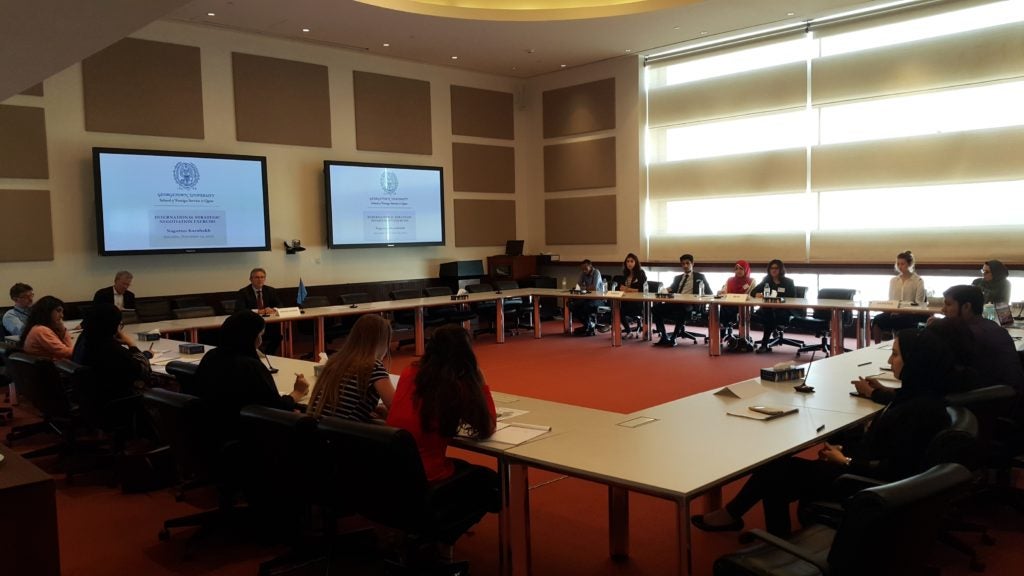Georgetown’s Flagship Diplomacy Training Event Tackles a Mock Crisis in the South Caucasus

Georgetown University in Qatar (GU-Q) recently concluded the diplomacy training event of the year, the International Negotiation and Crisis Simulation exercise, where students developed and practiced negotiation and strategic decision-making skills in a simulation exercise about a fictional crisis in the South Caucasus: the Rising Tension between Armenia and Azerbaijan Over Nagorno-Karabakh.
This year, the annual training event engaged teams of students representing Armenia, Azerbaijan, Nagorno-Karabakh, Iran, Russia, the United States, and Turkey, actual parties to the real conflict on which it’s based, in intensive, bilateral and multilateral negotiations that reconstruct real-world diplomatic processes. GU-Q’s prestigious flagship event, unparalleled by any other program in Qatar or the region, is organized in collaboration with Georgetown’s Institute for the Study of Diplomacy (ISD) in Washington D.C.
“The crisis simulation is a tremendous learning opportunity for our students regardless of which major they are pursuing,” said Dr. Christine Schiwietz, assistant dean for academic affairs at GU-Q and program organizer. “The critical thinking skills and negotiation tactics they learn in the process of resolving the diplomatic crisis will empower our students in both a personal and professional capacity, not just for those pursuing careers in Foreign Service.”
Dr. Schiwietz made sure students were prepped for the exercise with a workshop introducing them to the fundamental principles of interest-based negotiation found in the famous book, “Getting to Yes: How to Negotiate Agreement without Giving In,” presented by former U.S. diplomat and Director of Studies at Georgetown University’s Institute for the Study of Diplomacy, Dr. Jim Seevers. The workshop was open to all GU-Q students.
For Salman Ahad Khan, a senior majoring in International Politics, who attended both this year’s and last year’s simulations, the diplomacy workshops were beneficial outside the classroom as well. “They really helped to further my understanding of the U.S. Foreign Service during my four-month internship at the U.S. Embassy in Qatar last year.” In the exercise, Salman was part of the control room where he coordinated student engagement in the simulation by acting as the foreign office for each country.
For undeclared freshman, Katharine Danilowicz, who took on the role of delegate for the Russian Federation, keeping a level head was the most vital skill in diplomacy. “There were a few times in the negotiation where conversations got heated, and it was advantageous at that time to be the person in the room who was calm. I learned that politics only happen when everyone manages to calm down and realize what they truly want.”
Special guests and mentors supported the students’ efforts, including Dr. Seevers, Dr. Schiwietz, and the dean of GU-Q, Dr. Gerd Nonneman, who assumed the role of the “UN Special Representative” in the concluding discussions of the day.
The Nagorno-Karabakh, one of post-Soviet Europe’s “frozen conflicts”, is a landlocked mountainous region that is subject of an unresolved dispute between Azerbaijan, where it is located, and its ethnic Armenian majority. To date, negotiations have failed to produce a permanent peace agreement. Previous simulations focused on two emerging issues that would later become major headlines: the Syrian refugee crisis and the conflict in the South China Seas.